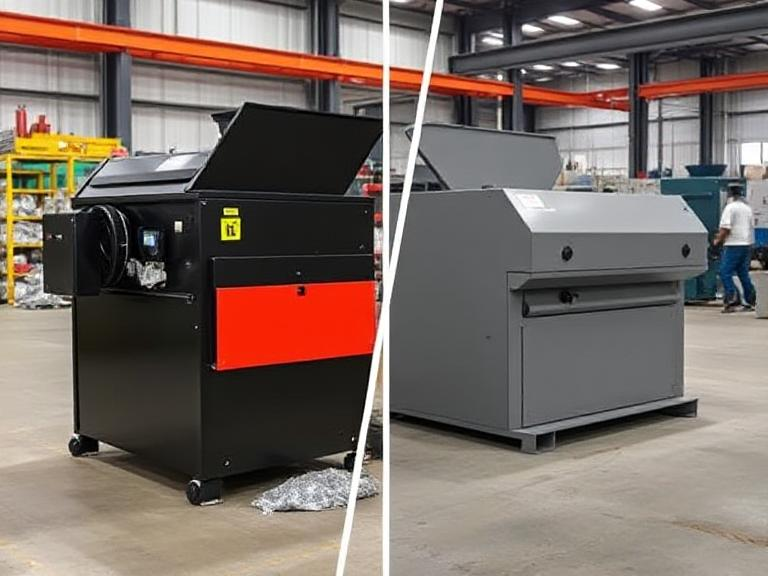Table of Contents
- Introduction
- What Is a Commercial Shredder?
- What Is an Industrial Shredder?
- Key Differences Between Commercial and Industrial Shredders
- Applications and Use Cases
- How to Choose the Right Shredder for Your Business
- About HB Shredder and Our Products
- Summary Table
Introduction
When it comes to waste processing and material reduction, choosing the right shredder is crucial. However, many businesses are unsure about the difference between a commercial shredder and an industrial shredder. This guide will clarify these distinctions, outline their specific applications, and help you decide which one fits your operational needs.

What Is a Commercial Shredder?
A commercial shredder is typically used by small to medium-sized businesses for general-purpose shredding tasks. These machines are often compact, user-friendly, and designed for relatively low-volume workloads.
Key Features of Commercial Shredders:
- Medium-duty operation: Best suited for offices, retail stores, or smaller production units.
- Compact design: Easy to store and move.
- Material type: Handles paper, cardboard, soft plastics, and sometimes light metals.
- Output volume: Typically limited to 100–500 kg/h depending on the model.
- Cost-effective: Lower upfront and maintenance costs compared to industrial units.
What Is an Industrial Shredder?
An industrial shredder is a high-powered machine used in large-scale operations such as manufacturing plants, recycling centers, and waste processing facilities. These machines are designed to handle continuous loads of tough materials.
Key Features of Industrial Shredders:
- Heavy-duty operation: Built to process thousands of kilograms per hour.
- Durable construction: Made of industrial-grade materials with long-lasting cutting blades.
- Material versatility: Can shred metal, hard plastics, wood, rubber, and construction debris.
- Customizability: Often tailored to specific industrial requirements (e.g., size reduction, output grain size).
- Automation: May include conveyor belts, auto-feeders, and programmable controls.
Key Differences Between Commercial and Industrial Shredders
1. Performance and Capacity
- Commercial shredders are designed for light to moderate workloads and intermittent use.
- Industrial shredders can operate continuously under heavy loads for hours or days.
2. Material Capability
- Commercial shredders: Paper, cardboard, soft plastics.
- Industrial shredders: Metal, hard plastics, construction waste, electronic waste.
3. Durability and Lifespan
- Commercial units wear out faster under intense use.
- Industrial models are engineered for longevity and high-resistance applications.
4. Cost and Maintenance
- Commercial shredders: Lower upfront and ongoing costs.
- Industrial shredders: Higher investment but lower cost per unit of material processed in large volumes.
5. Footprint and Installation
- Commercial: Portable or desk-sized models.
- Industrial: Large, stationary systems often requiring installation and dedicated space.
Applications and Use Cases
Commercial Shredder Applications
- Retail packaging disposal
- Office document shredding
- Small e-commerce warehouse packaging waste
- Soft plastic trimming in light manufacturing
Industrial Shredder Applications
- Scrap metal processing
- Plastic recycling plants
- Wood processing for biomass
- Municipal solid waste (MSW) management
- Electronic waste (e-waste) dismantling
How to Choose the Right Shredder for Your Business
Choosing the correct shredder depends on the following criteria:
- Material type: Know what materials you’ll be shredding most often.
- Processing volume: Estimate your daily or monthly shredding needs.
- Budget: Account for not only the purchase price but also installation and maintenance.
- Space availability: Do you have the floor space for a large industrial unit?
- Automation requirements: Do you need a conveyor, hopper, or auto-feed system?
About HB Shredder and Our Products
Huabing Machinery Technology Co., Ltd., known as HB Shredder, has over a decade of experience in producing shredders and precision blades. Since 2014, we have been committed to delivering high-performance waste shredding solutions across a wide range of industries.
Our Key Product Lines:
- Metal Shredder: Designed for reducing scrap metal for recycling.
- Plastic Shredder: Ideal for plastic injection molding waste and packaging materials.
- Trash Shredder: Suitable for municipal and commercial waste processing.
- Crushing Assembly Line: Integrated solutions that include conveyors, shredders, and sorters for large-scale operations.
HB Shredder provides tailored solutions based on customer material types, volume, and output requirements. We aim for maximum shredding efficiency with minimum operational cost.
Summary Table
| Aspect | Commercial Shredder | Industrial Shredder |
|---|---|---|
| Operation Type | Light to Medium Duty | Heavy Duty / Continuous |
| Material Compatibility | Paper, soft plastic, light cardboard | Metal, wood, hard plastic, waste |
| Output Volume | 100–500 kg/h | 1,000–10,000+ kg/h |
| Design | Compact and mobile | Large, floor-mounted |
| Price | Affordable | High investment |
| Best For | Offices, Retail, Small Warehouses | Recycling, Manufacturing, Waste Plants |
| Customization | Limited | Highly customizable |
